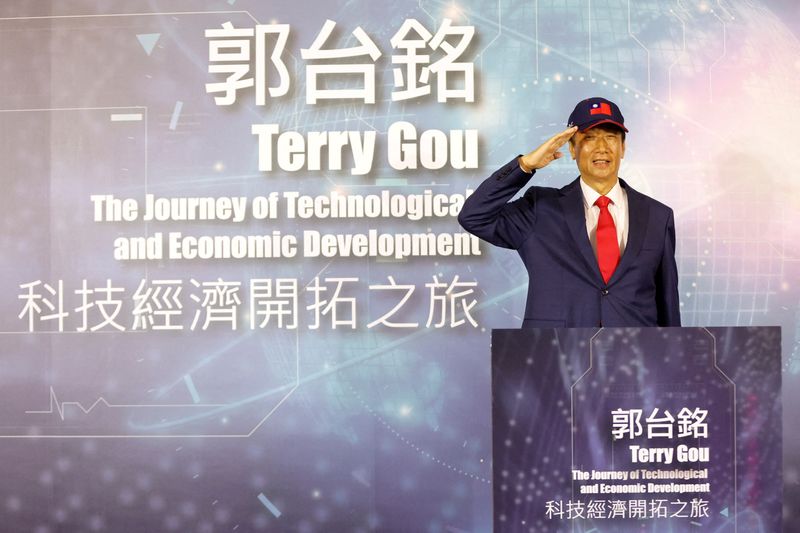TAIPEI (Reuters) - After mastering making iPhones, Taiwan's Terry Gou, the billionaire founder of major Apple (NASDAQ:AAPL) supplier Foxconn, wanted to turn his entrepreneurial skills elsewhere - to be the island's next president.
But three months out from the election, Gou, whose net worth is estimated by Forbes at $6.7 billion, has gone to ground.
He last appeared at a campaign event on Sunday night, the day a Chinese newspaper said authorities had begun a tax probe into Foxconn's operations in China, even though he stepped back from running the world's largest contract manufacturer four years ago.
He cancelled a Monday event without explanation and had no public arrangements for Tuesday or Wednesday, unusual given the previous frequency of his rallies.
The tax investigation was first reported by the state-backed, strongly nationalist Chinese tabloid the Global Times, but in its English version of the story it suggested what China was actually unhappy with was Gou running for president as an independent, a decision he announced in August.
That was because, the paper said, Gou would split the opposition vote and "in the end favour secessionist" Taiwan Vice President Lai Ching-te, making his victory more certain.
China claims Taiwan as its own and believes Lai, who leads opinion polls, is a separatist bent on a formal declaration of independence. Lai says he will maintain the status quo and that only Taiwan's people can decide their future.
Since the Global Times report came out, Gou's team has declined to comment, referring questions to Foxconn itself.
Gou, 72, has continued to post on his Facebook (NASDAQ:META) account, but not mentioned the probe.
Late on Tuesday, Gou posted about late Apple founder Steve Jobs, whom he called his idol, and how he "cherished" their relationship even with often tricky requests when it came to making iPhones.
"If I had thought of quitting because Steve Jobs was too picky and the tasks given by Apple were too difficult, and had given up on doing Apple orders, I would have probably lost a great opportunity to participate in Apple's innovation in the future," he wrote.
"Think big, but don't lose sight of details - this is the personality trait I noticed in Jobs. This is the trait in recent years I have come to expect in myself and encourage in every colleague around me."
Foxconn said in a statement on Sunday legal compliance was a "fundamental principle" of its operations, and it would "actively cooperate with the relevant units on the related work and operations".
'TAIWAN'S CEO'
Gou has positioned himself as "Taiwan's CEO" saying he wants to unite a fractured opposition amid rising tensions with China, which he blames on the ruling Democratic Progressive Party's (DPP) hostility to Beijing.
The DPP-led government has repeatedly offered talks with Beijing, but been rebuffed, and has blamed China for the tensions.
But Gou has languished in the polls and the two main opposition parties, the Kuomintang and Taiwan People's Party, have instead been talking to each other about a possible joint ticket, though those talks have foundered.
Gou was not born wealthy. After graduating from university, he worked in a series of factory jobs, as Taiwan in the late 1960s and early 1970s began using its cheap labour force to churn out consumer goods for the rich Western world.
He founded Hon Hai Precision Industry Co Ltd, better known as Foxconn, in 1974 with 11 elderly workers and a $7,500 loan from his mother. He first made cheap plastic parts for black-and-white television sets for a Chicago TV manufacturer, before a major deal in 1980 making joystick connectors for Atari games consoles.
In 2000, Foxconn won an order to make Apple's redesigned iMacs, after making a variety of parts for the likes of U.S. personal computer vendor Dell (NYSE:DELL).
Foxconn eventually became one of the world's largest private-sector employers with at times over a million workers assembling devices for global brands such as Sony Corp (TYO:6758), Nintendo Co Ltd (TYO:7974) and Microsoft Corp (NASDAQ:MSFT).
Gou remains a lauded figure at Foxconn after stepping down as chairman in 2019, referred to reverentially as "the founder".
His connections reached as high as Chinese President Xi Jinping, whom he met in 2014 in Beijing, and whom in 2017 he described as a great leader, Taiwan media reported.
Gou's parents were born in China and were of the generation that fled to Taiwan after the Communists won China's civil war in 1949, a year before Gou's birth on the island.
In an interview with the Communist Party's official People's Daily in 2018 to mark China's 40th anniversary of landmark economic reform, Gou said he was happy to have witnessed the changes.
Earlier this year, Gou vowed to start negotiations with China if he was elected president on the basis that both sides belong to one single China but each can interpret what that means.

Still, in August when announcing his run he struck a tougher tone when asked if his Foxconn shareholdings meant China could simply tell him what to do if he became president.
"I have never been under the control of the People's Republic of China," he said. "I don't follow their instructions."